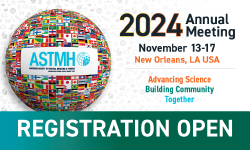| Past two years | Past Year | Past 30 Days | |
|---|---|---|---|
| Abstract Views | 641 | 329 | 20 |
| Full Text Views | 4 | 1 | 0 |
| PDF Downloads | 2 | 2 | 0 |
A Longitudinal Study of Malaria Antibodies in a Malaysian Population
II. Follow-Up of Individuals
Henry M. Mathews
Henry M. Mathews
Centers for Disease Control, Public Health Service, U.S. Department of Health and Human Services, U.S. Army Medical Research Unit, Institute for Medical Research, Atlanta, Georgia 30333, Malaysia
Search for other papers by Henry M. Mathews in
Current site
Google Scholar
PubMed
Search for other papers by Henry M. Mathews in
Current site
Google Scholar
PubMed
Timothy J. Dondero Jr.
Timothy J. Dondero Jr.
Centers for Disease Control, Public Health Service, U.S. Department of Health and Human Services, U.S. Army Medical Research Unit, Institute for Medical Research, Atlanta, Georgia 30333, Malaysia
Search for other papers by Timothy J. Dondero Jr. in
Current site
Google Scholar
PubMed
Search for other papers by Timothy J. Dondero Jr. in
Current site
Google Scholar
PubMed
A cohort of 62 persons living in a malaria-endemic area was examined by serology and by blood film 14 times over a 56-week period. Serologic responses (indirect hemagglutination test) of the group as a whole reflected the malaria transmission as determined by blood slide examination. The serologic responses of individuals showed titer changes that were not always consistent with blood slide results. The use of chloroquine may have modified the host's immune response.
Author Notes
Present address: Centers for Disease Control, Atlanta, Georgia 30333.
| Past two years | Past Year | Past 30 Days | |
|---|---|---|---|
| Abstract Views | 641 | 329 | 20 |
| Full Text Views | 4 | 1 | 0 |
| PDF Downloads | 2 | 2 | 0 |








